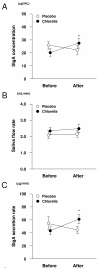Salivary secretory immunoglobulin A secretion increases after 4-weeks ingestion of chlorella-derived multicomponent supplement in humans: a randomized cross over study
- PMID: 21906314
- PMCID: PMC3182968
- DOI: 10.1186/1475-2891-10-91
Salivary secretory immunoglobulin A secretion increases after 4-weeks ingestion of chlorella-derived multicomponent supplement in humans: a randomized cross over study
Abstract
Background: Chlorella, a unicellular green alga that grows in fresh water, contains high levels of proteins, vitamins, minerals, and dietary fibers. Some studies have reported favorable immune function-related effects on biological secretions such as blood and breast milk in humans who have ingested a chlorella-derived multicomponent supplement. However, the effects of chlorella-derived supplement on mucosal immune functions remain unclear. The purpose of this study was to investigate whether chlorella ingestion increases the salivary secretory immunoglobulin A (SIgA) secretion in humans using a blind, randomized, crossover study design.
Methods: Fifteen men took 30 placebo and 30 chlorella tablets per day for 4 weeks separated by a 12-week washout period. Before and after each trial, saliva samples were collected from a sterile cotton ball that was chewed after overnight fasting. Salivary SIgA concentrations were measured using ELISA.
Results: Compliance rates for placebo and chlorella ingestions were 97.0 ± 1.0% and 95.3 ± 1.6%, respectively. No difference was observed in salivary SIgA concentrations before and after placebo ingestion (P = 0.38). However, salivary SIgA concentrations were significantly elevated after chlorella ingestion compared to baseline (P < 0.01). No trial × period interaction was identified for the saliva flow rates. Although the SIgA secretion rate was not affected by placebo ingestion (P = 0.36), it significantly increased after 4-week chlorella ingestion than before intake (P < 0.01).
Conclusions: These results suggest 4-week ingestion of a chlorella-derived multicomponent supplement increases salivary SIgA secretion and possibly improves mucosal immune function in humans.
Figures

Similar articles
-
Chlorella intake attenuates reduced salivary SIgA secretion in kendo training camp participants.Nutr J. 2012 Dec 11;11:103. doi: 10.1186/1475-2891-11-103. Nutr J. 2012. PMID: 23227811 Free PMC article. Clinical Trial.
-
Changes in salivary flow rate following Chlorella-derived multicomponent supplementation.J Clin Biochem Nutr. 2016 Jul;59(1):45-8. doi: 10.3164/jcbn.16-3. Epub 2016 May 21. J Clin Biochem Nutr. 2016. PMID: 27499578 Free PMC article.
-
The effect of Chlorella pyrenoidosa supplementation on immune responses to 2 days of intensified training.Eur J Nutr. 2018 Oct;57(7):2529-2536. doi: 10.1007/s00394-017-1525-9. Epub 2017 Aug 19. Eur J Nutr. 2018. PMID: 28825174 Free PMC article.
-
Potential of Chlorella as a Dietary Supplement to Promote Human Health.Nutrients. 2020 Aug 20;12(9):2524. doi: 10.3390/nu12092524. Nutrients. 2020. PMID: 32825362 Free PMC article. Review.
-
The effects of Chlorella vulgaris on cardiovascular risk factors: A comprehensive review on putative molecular mechanisms.Biomed Pharmacother. 2023 Jun;162:114624. doi: 10.1016/j.biopha.2023.114624. Epub 2023 Apr 3. Biomed Pharmacother. 2023. PMID: 37018990 Review.
Cited by
-
A computational fluid dynamic analysis of peri-bracket salivary flow influencing the microbial and periodontal parameters.PLoS One. 2013 Apr 19;8(4):e62242. doi: 10.1371/journal.pone.0062242. Print 2013. PLoS One. 2013. PMID: 23620815 Free PMC article.
-
Chlorella vulgaris as a food substitute: Applications and benefits in the food industry.J Food Sci. 2024 Dec;89(12):8231-8247. doi: 10.1111/1750-3841.17529. Epub 2024 Nov 18. J Food Sci. 2024. PMID: 39556490 Free PMC article. Review.
-
Chlorella intake attenuates reduced salivary SIgA secretion in kendo training camp participants.Nutr J. 2012 Dec 11;11:103. doi: 10.1186/1475-2891-11-103. Nutr J. 2012. PMID: 23227811 Free PMC article. Clinical Trial.
-
Changes in salivary flow rate following Chlorella-derived multicomponent supplementation.J Clin Biochem Nutr. 2016 Jul;59(1):45-8. doi: 10.3164/jcbn.16-3. Epub 2016 May 21. J Clin Biochem Nutr. 2016. PMID: 27499578 Free PMC article.
-
The effects of immunostimulatory herbal supplements on autoimmune skin diseases.J Am Acad Dermatol. 2021 Apr;84(4):1051-1058. doi: 10.1016/j.jaad.2020.06.037. Epub 2020 Jun 15. J Am Acad Dermatol. 2021. PMID: 32553683 Free PMC article. Review.
References
-
- McMurray DN, Rey H, Casazza LJ, Watson RR. Effect of moderate malnutrition on concentrations of immunoglobulins and enzymes in tears and saliva of young Colombian children. Am J Clin Nutr. 1977;30:1944–1948. - PubMed
-
- Watson RR, McMurray DN, Martin P, Reyes MA. Effect of age, malnutrition and renutrition on free secretory component and IgA in secretions. Am J Clin Nutr. 1985;42:281–288. - PubMed
-
- Sirisinha S, Suskind R, Edelman R, Asvapaka C, Olson RE. Secretory and serum IgA in children with protein-calorie malnutrition. Pediatrics. 1975;55:166–170. - PubMed
-
- Gangopadhyay NN, Moldoveanu Z, Stephensen CB. Vitamin A deficiency has different effects on immunoglobulin A production and transport during influenza A infection in BALB/c mice. J Nutr. 1996;126:2960–2967. - PubMed
Publication types
MeSH terms
Substances
LinkOut - more resources
Full Text Sources
Other Literature Sources
Medical

